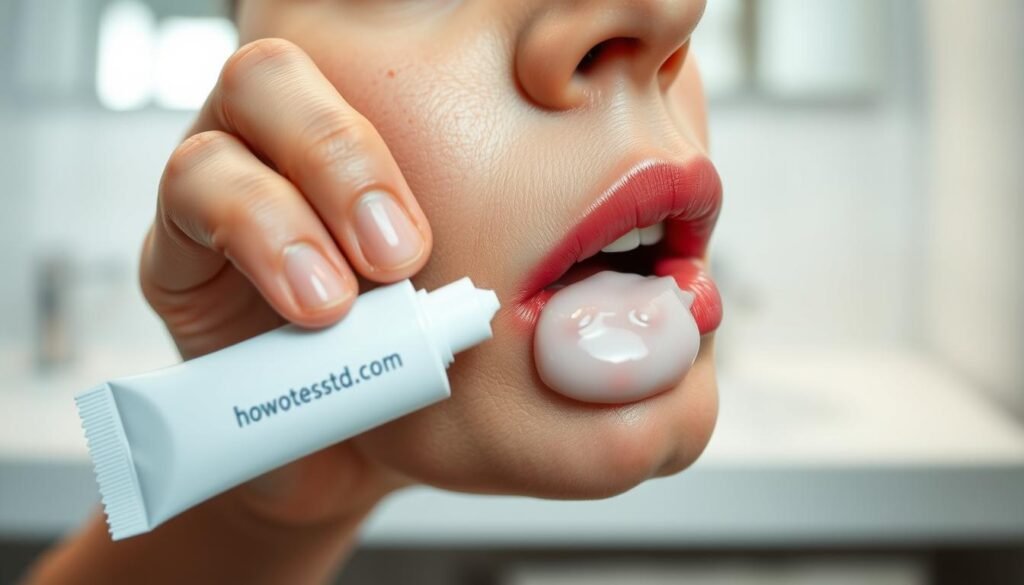Can You Get Rid of Herpes?
About 40 to 50 million adults in the U.S. have genital herpes. This is what the Centers for Disease Control and Prevention say. It shows how common herpes is and why finding a herpes cure is important.
It’s important to take care of your health. If herpes worries you, don’t wait to get tested. Knowing about herpes and the treatments available can help you manage it well.
Key Takeaways
- Genital herpes affects millions of adults in the United States.
- Understanding the condition is key to managing it.
- Getting tested is a critical step in taking control of your health.
- Various treatment options are available to help manage herpes.
- Proactive health measures can greatly improve your overall well-being.
Understanding Herpes: Types, Symptoms, and Transmission
It’s important to know about herpes to manage it well. Herpes simplex virus (HSV) is a virus that causes different kinds of infections. These infections depend on the type of HSV and where it happens.
HSV-1 vs. HSV-2: Key Differences
There are two main types of herpes simplex virus: HSV-1 and HSV-2. HSV-1 usually causes cold sores around the mouth. On the other hand, HSV-2 is mostly linked to genital herpes, which is spread through sex. But, both can infect other areas if there’s contact between the mouth and genitals.
Recognizing Herpes Symptoms and Outbreak Stages
Knowing the signs of herpes is key to handling it. The first time you get it, symptoms are often worse. You might feel:
- Painful blisters or sores
- Itching or burning sensations
- Fever and swollen lymph nodes
Later outbreaks are usually milder. They might start with tingling or itching before the sores appear.
Common Transmission Routes and Misconceptions
Herpes spreads mainly through skin-to-skin contact with someone who’s infected. Many people think herpes only spreads when there are sores. But, viral shedding can happen even when there are no symptoms. This means you can get herpes even when it doesn’t seem like you have it.
It’s really important to take care of your health. Don’t wait to get tested. Knowing you have herpes early can help a lot in managing it.
Can You Get Rid of Herpes? The Medical Reality
It’s important to know how herpes works to manage it well. Herpes is caused by a virus and can’t be cured. But, there are treatments to help with its symptoms.
Why Herpes Remains in the Body Permanently
Herpes stays in the body forever because it hides in nerve cells. The virus can stay hidden for a long time, then come back when it wants to.
The virus hides in nerve ganglia, making it hard for the immune system to find it. This makes it hard to get rid of the virus completely.
Latency Periods and Viral Shedding Explained
Latency periods are when the virus is not active and you don’t have symptoms. But, there’s a chance of viral shedding even then. This means the virus can spread to others.
- Viral shedding can happen even when you don’t have symptoms.
- Antiviral meds can lower the chance of spreading the virus.
- Knowing about viral shedding helps keep others safe.
Setting Realistic Treatment Expectations
Even though herpes can’t be cured, meds can help a lot. It’s key to know what to expect from treatment. It’s about managing symptoms, not getting rid of the virus.
Treatments include taking meds all the time to prevent outbreaks, or taking them only when you have an outbreak. Talking to a doctor can help find the best treatment for you.
It’s very important to take care of your health. Don’t delay getting tested. While there’s no cure, meds can help control symptoms and outbreaks.
Conventional Medical Treatments for Herpes
For those with herpes, medical treatments can help. They manage symptoms and stop future outbreaks. These treatments use antiviral drugs to lessen outbreak severity and frequency.
Prescription Antivirals: Acyclovir, Valacyclovir, and Famciclovir
Acyclovir, valacyclovir, and famciclovir are top choices for herpes treatment. They target the virus, cutting down its spread. This makes symptoms less severe. Acyclovir is used for first outbreaks and can be taken by mouth or applied directly.
Valacyclovir and famciclovir are also good options. They need to be taken less often because they last longer in the body.
Suppressive Therapy vs. Episodic Treatment Approaches
There are two main ways to treat herpes: suppressive therapy and episodic treatment. Suppressive therapy means taking medicine every day to stop outbreaks. It’s good for those who get outbreaks often.
Episodic treatment is for when symptoms start. It helps make outbreaks shorter and less severe.
Effectiveness Rates and Possible Side Effects
Antiviral drugs work well against herpes. They cut down on how often and how bad outbreaks are. But, they can cause side effects like headaches and tiredness.
Talking to your doctor about your health is key. They can help find the best treatment for you.
Don’t wait to get tested if you think you have herpes. Early treatment can really help manage the condition.
Managing Herpes Outbreaks Effectively
Managing herpes outbreaks well means knowing the signs early and using the right treatments. By spotting herpes symptoms early, you can make them less bad and shorter.
Identifying Prodromal Symptoms and Early Intervention
Spotting prodromal symptoms is key to acting fast. These signs, like tingling or itching, mean an outbreak is coming. Starting treatment early can make the outbreak less severe.
Some common prodromal symptoms include:
- Tingling or itching sensations
- Burning or numbness
- Mild pain or discomfort
Topical Treatments and Pain Management Options
Topical treatments are very important for herpes symptoms. Antiviral creams and pain-relieving ointments can lessen outbreak severity and ease pain.
Some effective topical treatments include:
- Acyclovir cream
- Lidocaine ointment for pain relief
- Docosanol cream

Healing Strategies to Reduce Outbreak Duration
To make herpes outbreaks shorter, use healing strategies. Keep the area clean and dry, avoid tight clothes, and use cold compresses.
Also, eating well and managing stress can help your immune system. This can lower how often outbreaks happen.
It’s very important to take care of your health. Don’t delay getting tested.
Natural and Alternative Remedies for Herpes Relief
There are ways to manage herpes beyond medicine. Natural remedies and lifestyle changes can help. Many people use these methods to feel better and have fewer outbreaks.
Evidence-Based Natural Treatments
Some natural supplements can help with herpes symptoms. Here are a few:
- Lysine: An amino acid that may help reduce outbreak frequency by inhibiting arginine, which can trigger herpes replication.
- Zinc: Essential for immune function, zinc supplements can support the body’s natural defenses against herpes.
- Lemon Balm: Known for its antiviral properties, lemon balm can be applied topically to soothe herpes lesions and reduce healing time.
Immune-Boosting Dietary Considerations
A strong immune system is key to managing herpes. Eating the right foods can help:
| Food | Benefit |
|---|---|
| Foods rich in antioxidants (berries, leafy greens) | Reduce oxidative stress and support immune health |
| Omega-3 fatty acids (salmon, flaxseeds) | Anti-inflammatory properties to support overall health |
| Probiotics (yogurt, kefir) | Enhance gut health and boost immune response |
Stress Reduction Techniques to Prevent Recurrences
Stress can make herpes worse. Here are ways to reduce stress:
- Meditation and mindfulness: Practices that reduce stress and promote relaxation.
- Yoga: Combines physical movement with stress-reducing techniques.
- Adequate sleep: Ensuring sufficient rest is key for immune function and stress management.
Using these natural remedies and lifestyle changes can help manage herpes. It can also improve your life quality.
The Importance of Proactive Testing and Early Diagnosis
Getting tested for herpes is a smart health move. It lets you act fast. This way, you can take charge of your health and make good choices.
Available Testing Methods and Accuracy Rates
There are many ways to test for herpes. You can use viral culture, PCR, or serology tests. Each test works differently and is used in certain situations.
PCR is very good at finding the virus, even when you don’t have symptoms. Knowing about these tests helps you get the right one for you.
Why Early Detection Matters for Treatment Success
Finding herpes early is key to treating it well. Starting antiviral meds early helps a lot. It makes outbreaks less bad and shorter.
Early treatment also helps you feel better. It makes herpes outbreaks less frequent and less severe.
Recommended Testing Frequency and Circumstances
How often you should test for herpes depends on your life. If you’re active or have symptoms, it’s time to test. Testing is also smart if you have many partners.
- Test if you have symptoms or if your partner has herpes.
- Test often if you have many partners.
- Talk to a doctor about when to test.
Testing early is a big step in managing herpes. It helps you stay healthy and avoid passing it to others. It’s a key part of herpes prevention strategies.
Living with Herpes: Psychological and Social Aspects
Managing herpes is more than just treating outbreaks. It’s about dealing with the emotional and social sides too. Feeling isolated, anxious, or depressed is common. It’s key to tackle these feelings to live well with herpes.
Overcoming Stigma and Managing Emotional Impact
The stigma of herpes can be tough. For emotional help, check out Asha Sexual Health. Fighting stigma means learning and talking openly about herpes.
“The greatest glory in living lies not in never falling, but in rising every time we fall.” – Nelson Mandela
This quote shows the importance of being strong. To be resilient, manage stress, stay healthy, and ask for help when needed.
Effective Partner Disclosure Strategies
Telling a partner about herpes is a big step. It’s about picking the right time and place. Be honest and talk about how to lower the risk of passing it on. It’s about being open and building trust.
Support Groups and Counseling Resources
Support groups and counseling are very helpful. They let you share your story, get support, and learn from others with herpes.
| Resource | Description |
|---|---|
| Support Groups | Online or in-person groups where individuals share their experiences and support one another. |
| Counseling Services | Professional counseling to help manage the emotional impact of herpes. |
Living with herpes needs a full approach. This includes medical care, emotional support, and understanding from others. By facing the emotional and social sides, you can have a good life.
Preventing Herpes Transmission and Reducing Outbreaks
There are ways to stop herpes from spreading and to have fewer outbreaks. Safe sex, healthy living, and taking medicine as told can help a lot. These steps can lower the chance of passing herpes to others and make outbreaks less common.
Barrier Methods and Safe Sex Practices
Using barriers during sex is key to stop herpes from spreading. Condoms can help a lot if used right and all the time. But remember, condoms might not cover all virus areas, so more steps are needed.

Lifestyle Modifications to Strengthen Immune Response
Living healthy can make your immune system stronger. This means eating well, exercising often, and handling stress well. A strong immune system can keep herpes under control, making outbreaks less and less severe.
Medication Adherence and Preventive Strategies
For those with herpes, taking medicine as told is very important. Suppressive therapy can cut down on outbreaks and lower transmission risk. It’s also key to stay on top of health and get tested right away if you think you’ve been exposed.
By following these steps, you can manage herpes better, have fewer outbreaks, and stop it from spreading. It’s really important to take care of your health. Don’t wait to get tested.
Conclusion: Living Well Despite Herpes
Many ask if you can get rid of herpes. But, herpes is a lifelong condition. Yet, with the right treatment, people can live healthy and happy lives.
It’s important to know there’s no herpes cure. Instead, focus on managing symptoms and outbreaks. This way, you can live well with herpes.
Getting tested and getting the right care is key. By managing herpes well, you can live a full life. This includes medical treatments, lifestyle changes, and ways to reduce stress.
Living with herpes can be tough. But, by staying informed and taking charge of your health, you can handle it. Always prioritize your health and seek medical help when needed.
FAQ
What is herpes, and how is it transmitted?
Herpes is a viral infection caused by the herpes simplex virus (HSV). It has two main types: HSV-1 and HSV-2. It spreads through skin-to-skin contact, like kissing and sexual activity.
Can herpes be cured?
No, there’s no cure for herpes. But, treatments like antiviral meds can help manage symptoms. They can also reduce how often outbreaks happen and stop the virus from spreading.
What are the symptoms of a herpes outbreak?
Symptoms include painful blisters, itching, and burning. You might also feel flu-like. Some people feel tingling or numbness before an outbreak.
How can I manage herpes outbreaks?
To manage outbreaks, watch for early signs and use topical treatments. Pain management is key. Antiviral meds like acyclovir can also help make outbreaks shorter and less severe.
Are there natural remedies that can help alleviate herpes symptoms?
Yes, natural remedies like lysine and zinc might help. Lemon balm and stress-reducing activities like meditation can also ease symptoms.
How can I prevent herpes transmission?
To prevent transmission, practice safe sex and use barriers. Avoid skin contact during outbreaks. Antiviral meds can also lower transmission risk.
Why is getting tested for herpes important?
Testing is key for early treatment. It helps manage symptoms, lowers transmission risk, and prevents complications.
What are the available testing methods for herpes?
Tests include viral culture, PCR, and serology. These detect HSV antibodies. The right test depends on symptoms and medical history.
Can herpes be managed without medication?
While meds are often needed, lifestyle changes help too. Eating well, reducing stress, and exercising regularly can aid in managing herpes.
How can I cope with the emotional impact of having herpes?
Seek support from healthcare, groups, and loved ones. Self-care, stress management, and open communication with partners are also important.
Related Posts

Symptoms of STDs in Men: What to Look For

Uninsured? No Problem! STD Testing Options for the Uninsured
